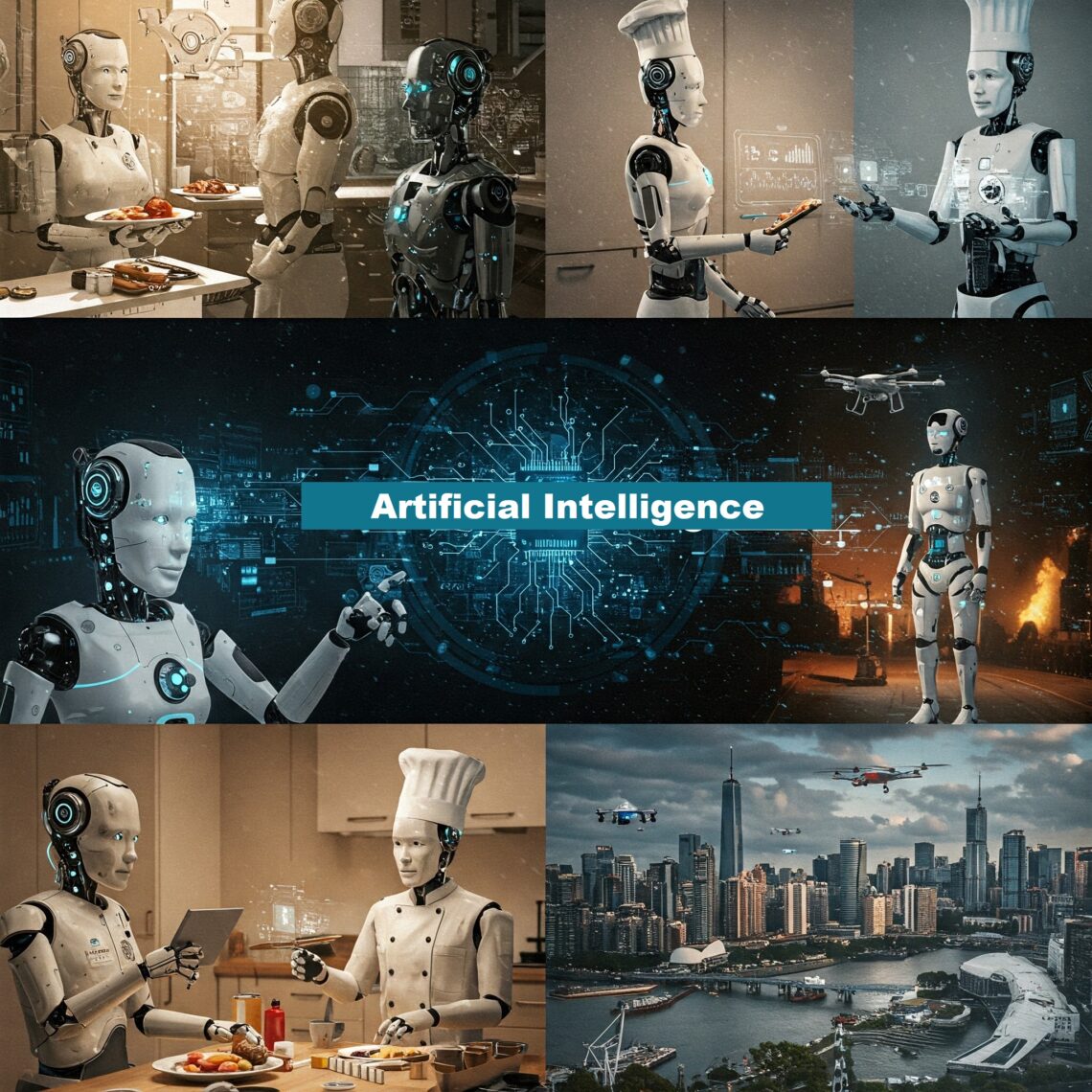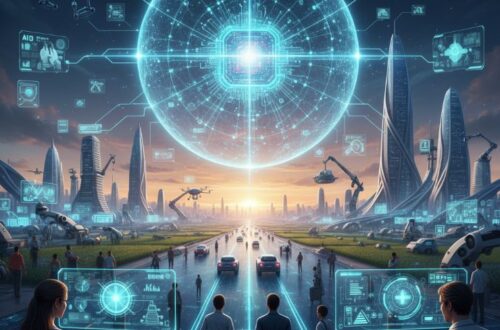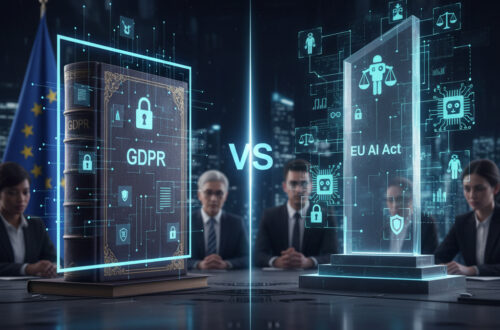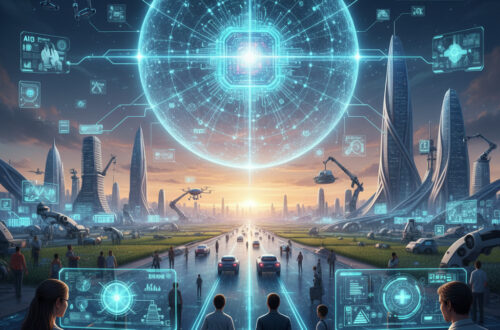Introduction
Artificial Intelligence (AI), at its core, is about creating machines that can think and act like humans. It involves teaching computers to learn, problem-solve, and make decisions. While the concept might sound futuristic, AI is rapidly weaving its way into the fabric of our modern lives. From the devices we hold in our hands to the industries that power our economies, Artificial Intelligence is no longer a distant promise but a tangible reality. Understanding exactly how AI is changing the world is crucial for navigating the present and preparing for the future.
1. AI in Everyday Life
You likely interact with AI multiple times a day without even realizing it. AI at home is becoming increasingly common with the rise of smart devices.
- Smart assistants like Alexa, Siri, and Google Assistant use AI to understand your voice commands, answer questions, play music, set reminders, and control other smart home devices.
- AI powers the sophisticated recommendation systems on platforms like YouTube, Netflix, and Amazon, suggesting content and products based on your past behavior and preferences.
- Your smartphone is packed with AI. From intelligent cameras that automatically adjust settings to voice recognition for dictation and autocorrect that learns your typing habits, AI in daily life enhances our mobile experience.
2. AI in Healthcare
The potential of AI in medicine is immense, promising to revolutionize patient care and medical breakthroughs.
- AI diagnostics are being developed to analyze medical images like X-rays, MRIs, and CT scans with remarkable accuracy, helping to detect diseases like cancer earlier.
- Healthcare AI utilizes predictive analytics to forecast patient outcomes, identify individuals at high risk, and optimize treatment plans.
- Robotic surgeries, guided by AI, offer greater precision and minimally invasive procedures. Virtual nursing assistants powered by AI can monitor patients and provide personalized support.
3. AI in Education
AI in education is paving the way for more personalized and effective learning experiences.
- Personalized learning platforms, like certain features on Khan Academy or Duolingo, use AI algorithms to adapt the curriculum to each student’s pace and learning style.
- AI is being used for grading automation, freeing up educators’ time for more direct student interaction and curriculum development.
- Language learning is being transformed through AI-powered chatbots that provide interactive conversation practice and instant feedback.
4. AI in Business and Finance
AI in business and the financial sector is driving efficiency, security, and new opportunities.
- AI in fraud detection systems analyze vast amounts of transaction data to identify suspicious patterns and prevent financial crime.
- Algorithmic trading utilizes AI to make split-second decisions in stock markets based on complex data analysis.
- Chatbots for customer service and sales, powered by AI, provide instant support, answer queries, and guide customers through the sales process.
5. AI in Transportation
The future of transportation is increasingly intertwined with AI in transport.
- Self-driving cars and autonomous delivery drones are becoming a reality, promising to improve safety and efficiency in logistics.
- AI is being implemented in traffic management systems to optimize traffic flow, reduce congestion, and improve travel times.
- Predictive maintenance using AI helps transportation companies anticipate potential issues with vehicles and fleets, reducing downtime and costs.
6. AI in Agriculture
AI in farming is leading to more sustainable and productive agricultural practices.
- AI-powered crop monitoring systems use drones and sensors to analyze plant health, soil conditions, and pest infestations, enabling targeted interventions.
- Predictive weather analysis powered by AI helps farmers make informed decisions about planting, irrigation, and harvesting.
- Smart irrigation systems use AI to optimize water usage based on real-time data, conserving resources.
7. AI in Manufacturing and Industry
AI in manufacturing and other industrial sectors is driving automation and efficiency.
- Robotics and AI-driven automation are streamlining production processes, increasing speed, and reducing errors.
- Quality control systems using AI and computer vision can detect defects in products with greater accuracy and speed than human inspectors.
- Supply chain optimization utilizes AI to predict demand, manage inventory, and improve logistics.
8. Social and Ethical Impacts
The widespread adoption of AI also raises important AI ethics considerations and social impacts.
- The impact of AI and job displacement is a significant concern, although many experts believe AI will create new jobs while transforming existing ones.
- Bias in AI algorithms, often stemming from biased training data, can lead to unfair or discriminatory outcomes.
- Ethical considerations surrounding privacy, control over autonomous systems, and fairness in AI applications are crucial areas of ongoing discussion and regulation.
9. Global Impact and the Future of AI
AI is reshaping global AI trends and economies, driving innovation and competition between nations. The role of governments and regulations is becoming increasingly important in guiding the development and deployment of AI responsibly. Predictions for the future of AI in the next 5–10 years include even more sophisticated AI applications in various sectors, advancements in natural language processing and computer vision, and continued discussions around AI future impact and governance.
Conclusion
Artificial Intelligence is no longer a futuristic concept; it is a powerful force making tangible changes across all aspects of modern life. From the convenience of smart assistants to life-saving applications in healthcare and efficiency gains in industry, AI‘s contributions are undeniable. As we continue to integrate AI into our world, it is crucial to learn, adapt, and engage with this transformative technology responsibly, ensuring its benefits are realized while mitigating potential risks.





